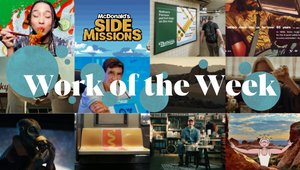
Graeme Noble on Hiding Suzuki’s Swift and The Idea Behind ‘Good Different’

In an industry often dominated by predictable formulas, TMW's chief creative officer, Graeme Noble, decided to take a bold detour with the Suzuki Swift campaign.
Instead of showcasing the car, the team at TMW opted to hide it, crafting an intriguing narrative that aligned perfectly with Suzuki’s ‘Good Different’ platform.
Graeme sat down with LBB writer Olivia Atkins to delve into the creative process, understand the client’s enthusiasm for breaking the mould and how the team navigated turning an ambitious idea into a reality.
LBB> What inspired the idea of hiding the Suzuki Swift instead of showcasing it in the ad?
Graeme> From our initial talks, we learned that Suzuki isn’t always on everyone’s radar, but those who try one, quickly fall in love. They loved the driving experience and the exclusive feeling of being part of a select group of owners ‘in the know’.
Further research led us to believe that those we were targeting wouldn’t want to drive around in something that feels generic or overdone, which tied in perfectly with Suzuki’s Good Different Platform.
This felt especially true for the Swift. A car that was loved by its owners but maybe underappreciated. It has tons of brilliant specs as standard, but the average person couldn’t tell you much about it. The thought of it being ‘the best kept secret on the road’ flowed from there.
At the heart of the idea is the feeling we have when we discover something especially good that not many other people know about. We don’t want it to lose its charm by everyone knowing about it. Whether it’s a new band, a TV show or a restaurant, most of us have had that moment of disappointment when a beloved cult classic becomes something that even your mum is talking about.
So, while it was our job to advertise how good the car was, we thought that many Swift owners would be hoping we fail – ‘because Good Different isn’t different at all, if everyone has one.’
From there, it was finding different ways in which these Swift owners could sabotage our ads, and how that would work differently across each channel. There was a lot of time thinking up devious ways we would hide cars or deface advertising hoardings if we were the ones trying to stop a message getting out.
LBB> How receptive was the client to this idea? Were they onboard from the get go?
Graeme> Absolutely. From the beginning of the pitch process, the Suzuki team made it clear that they wanted to create something that stood out from the crowd, and that was true until the end. That sort of ambition was music to our ears, and probably the key reason why we’re so happy with how it’s turned out.
LBB> Why were Traktor the right directors for the job?
Graeme> The reason we went with Traktor was mainly due to the level of detail they provided in their treatment. They totally saw the vision and built upon our foundations. They gave each character a full back story to help them get into character which was a nice touch. And, of course, it didn’t hurt that they’re up there as the most awarded directors in advertising, I suppose.
LBB> Most car ads have a tried and tested formula for shooting ads, why did you decide to do something different?
Graeme> I think you might have answered your question! Too much advertising is ‘correct’ but not in any way interesting and car advertising especially can take itself too seriously. We want to make people smile and small cars seem to have more licence to have a more playful personality.
The Swift has bags of it, and I think that really comes across. By its very nature, creativity has to have something unexpected about it for it to be effective. Our job as creative agencies is to make work that makes people notice it, otherwise, it’s just not memorable. If we’re just making the comms that people subconsciously expect to see, we’re not going to do much more than blend into the background.

LBB> What were some key challenges in the spot and how did you overcome them?
Graeme> It was about striking the right balance between owners hiding their cars – making it clear that they’re hiding them because they want to keep them a secret, while at the same time, showing enough of the car for viewers to want one themselves.
Pushing boundaries always makes for the best work and the client was happy to work with us all the way in doing something that stood out. I’ve also learned that media owners aren’t keen to see their property being vandalised – even if it’s not real vandalism!
Our approach to integration means we’re not just looking at one channel. Rather than creating a TV ad and cutting it different ways, it’s always about creating an idea that works from the middle out. That’s definitely one of the things we’re proudest of with this campaign. The TV, the OOH and the radio all live and breathe the same messaging but they’re brought to life in such channel-specific ways – whether it’s press ads looking torn out, or radio being sabotaged by an owner insisting on 'showing pictures of the car rather than actually talking about – and they’re much more memorable for it.















